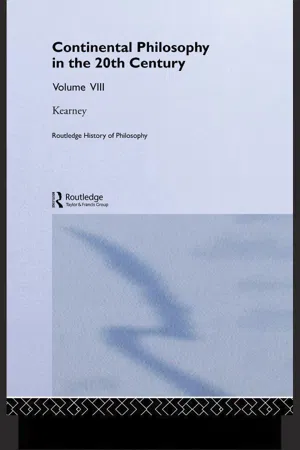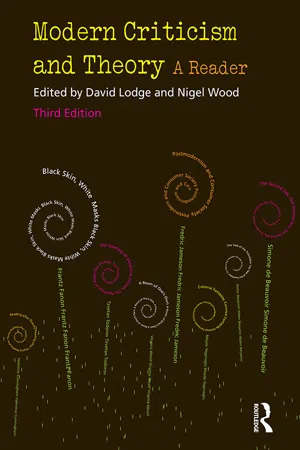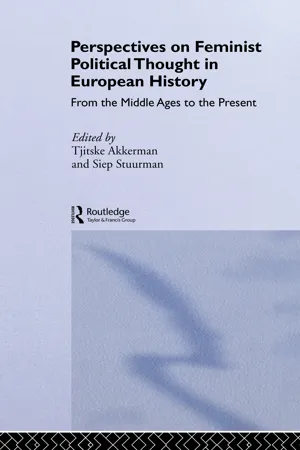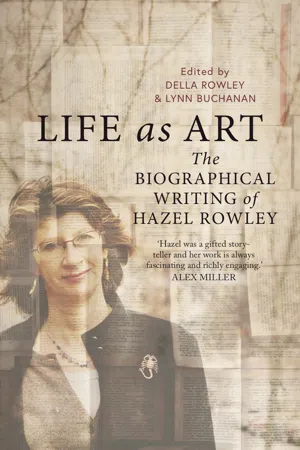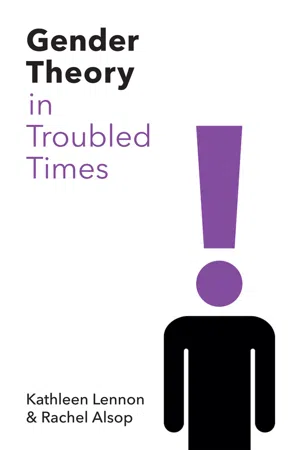Politics & International Relations
Simone de Beauvoir
Simone de Beauvoir was a French existentialist philosopher, writer, and feminist theorist. She is best known for her influential work "The Second Sex," which examined the oppression of women in society. Beauvoir's ideas on gender, freedom, and ethics have had a significant impact on feminist theory and continue to be influential in discussions of gender politics and equality.
Written by Perlego with AI-assistance
Related key terms
Related key terms
1 of 4
Related key terms
1 of 3
11 Key excerpts on "Simone de Beauvoir"
- eBook - ePub
Routledge History of Philosophy Volume VIII
Twentieth Century Continental Philosophy
- Richard Kearney(Author)
- 2003(Publication Date)
- Routledge(Publisher)
are the ones (amongst others) over whose heads this discussion often seems to take place, and deserve to be able to make their own contribution.Simone de Beauvoir
Simone de Beauvoir is perhaps the best-known feminist philosopher of the twentieth century. Her lifelong association with Jean-Paul Sartre seems to have been on the whole one of mutual intellectual inspiration and companionship.14 De Beauvoir’s work on the moral implications and the social context of existentialism, for example in her 1947 work Pour une morale de l’ambiguité (translated as The Ethics of Ambiguity)15 was influential upon Sartre, an influence discernible in his shift of focus from the individual consciousness in Being and Nothingness16 to the more collective or situated concerns of his later work. The publication in 1949 of de Beauvoir’s best-known work, The Second Sex,17 continued her interest in these themes, a work which provoked reviewers to express outrage at a book which was seen to herald the breakdown of social relations. However, given that de Gaulle had granted French women the vote only five years earlier, the radical impact of this book should not be underestimated.The Second Sex is a rich and complex work which draws upon literature, myth and religion, theories of biology, accounts of social and economic development (Marxism and psychoanalysis), but also existentialist philosophy. De Beauvoir’s aim is to address the question ‘What is a woman?’18 It is because her painstaking analysis uncovers and addresses the nature of the oppression and exclusion of women that it has been significant in the history of feminist thought. But de Beauvoir is also responsible for the promotion of questions of sexual difference on to the philosophical agenda, and for probing questions about the social context of the existentially free individual. Sartre, Merleau-Ponty and other existentialist thinkers agreed that sexuality was an issue that had been largely disregarded in philosophy, but de Beauvoir’s work most insistently asks questions of the relevance of sexual difference to philosophical notions of identity, an insistence Michèle Le Doeuff has called ‘a characteristic genius for the inappropriate’.19 - eBook - ePub
- Jenny Edkins, Nick Vaughan-Williams, Jenny Edkins, Nick Vaughan-Williams(Authors)
- 2009(Publication Date)
- Routledge(Publisher)
6 Simone de BeauvoirKimberly Hutchings
Simone de Beauvoir’s life stretched across most of the twentieth century, encompassing tremendous events and changes from the impact of two world wars to post Second World War violent processes of decolonisation in Asia and Africa, the civil rights movement in the US, uprisings in Hungary and Czechoslovakia, student radicalism and the birth of second wave feminism in Europe and the USA. She was a philosopher, a feminist, a novelist, a political commentator and (sometimes) a political activist. She was also a public intellectual, part of a group of thinkers and writers who helped to develop the distinctively French phenomenological philosophy: existentialism. Jean-Paul Sartre, the leading exponent of existentialist philosophy, was Beauvoir’s lover, friend and philosophical partner for fifty years, until his death in 1980. As commentators on Beauvoir have noted, her association with Sartre has often led to the dismissal of the independent value of Beauvoir’s philosophical work. However, Beauvoir did make a significant contribution to traditions of critical theory, in her work on ethics and politics in The Ethics of Ambiguity (first published in 1947, see Beauvoir 1948) and in her groundbreaking feminist text The Second Sex (first published in 1949, see Beauvoir 1997).We have an unusually detailed knowledge of Beauvoir’s life. Not only did she use her personal experiences in her novels, but she was also very public about the unorthodox way she chose to live her personal life, and wrote about this extensively in her autobiographical works (Beauvoir 1959, 1965a, 1965b, 1972, Rowley 2007). Beauvoir came from a middle class family and was brought up with the stultifying expectations on girls that this implied in early twentieth century France. She challenged these expectations, however, through her brilliance as a scholar, becoming a graduate student in philosophy at the Sorbonne. During the 1930s, she developed her philosophical ideas in dialogue with Sartre, Merleau-Ponty and others, whilst also teaching philosophy and studying German phenomenology, including the work of Husserl and Heidegger. She spent most of the war in occupied Paris, during which time she studied Hegel, and published her first novel in 1943. Although Beauvoir herself played no major role in any resistance movement, it is clear from The Ethics of Ambiguity that the example of the French resistance during the war, for Beauvoir, posed key questions about the meaning of ethical responsibility and resistance to injustice, and the role of violence in politics. In the aftermath of the war, Beauvoir was one of the founders of the leftist journal Les Temps Modernes, and also aligned herself with the anti-Stalinist left in France. As an increasingly famous (notorious) public intellectual and writer, she openly opposed the French war in Algeria, and in her later years supported student radicals in 1968 and the women’s movement, including campaigns against legal and political discrimination and for the legalisation of abortion. As second wave feminism took off in the 1960s, feminist scholars began to study The Second Sex - eBook - ePub
- Marcel Stoetzler(Author)
- 2017(Publication Date)
- Manchester University Press(Publisher)
13What is a woman, and who is asking anyway?Simone de Beauvoir
Simone de Beauvoir (1908–86) was a French philosopher and novelist whose best-known theoretical work, The Second Sex (1949), became one of the core texts of twentieth-century feminism. She did not, though, consider herself a feminist at the time of writing it: de Beauvoir became a feminist in the process of working through, at a more general level, the philosophical problem of freedom. In many of her philosophical writings as well as her novels – sometimes described as ‘metaphysical novels’ as they are really philosophical reflections in the form of novels, avoiding the abstractly conceptual and often dogmatic character of academic philosophy – she discussed freedom in relation to where one finds oneself, i.e. in what societal and historical situation and also in what kind of body. If as a human being I am essentially a creature meant to be free, then how can I live in accordance with the commandment to be free in an unfree situation? One of the classical problems of the philosophical tradition, this was central in one way or another to her entire life work. This philosophical problem also forced her into the field of social theory.De Beauvoir, born in Paris, was from a conservative bourgeois family who had lost their fortune in the war economy and high inflation of the First World War. During childhood, her intellectual development benefited from a rich mix of cognitive dissonances: her family were bourgeois in terms of status and education, but had little money in the bank; her mother was religious, as was Simone until the age of 14, while her father was an atheist and rationalist; her father was very proud of her sharp mind and complimented her on thinking ‘like a man’. From this confusing input de Beauvoir drew the very sensible conclusion that she should best live her life her own way, and succeeded in this to such an extent that she became for subsequent generations of independent-minded youth an icon for her lifestyle as much as for her writing. She studied mathematics, literature and philosophy, graduating with a thesis on the rationalist philosopher and mathematician Gottfried Leibniz (1646–1716). She was one of the first women to graduate from the Sorbonne (since the Middle Ages and still at the time the central institution of the University of Paris) and went on to take the examination in philosophy at the even more prestigious École Normale Supérieure, a modern institution founded during the French Revolution whose role it is to train and select the meritocratic elite of the French state, including professors, researchers and highlevel government officials. De Beauvoir came second in her cohort, narrowly beaten to first place by Jean-Paul Sartre (1905–80), with whom she then began a life-long relationship. De Beauvoir was just 21 at the time, the youngest person ever to pass this examination. - Professor Stuart Sim, Noel Parker(Authors)
- 2014(Publication Date)
- Routledge(Publisher)
B_______Beauvoir, Simone de (1908–1986)
Simone de Beauvoir was born in Paris to bourgeois parents, to become the elder of two daughters. Beauvoir attended a Catholic girls' school and later was enrolled at the Sorbonne. While preparing for the highly competitive French national examination (l'agrégation ) she attended some philosophy lectures at the prestigious Ecole Normale Supérieure , at that time, strictly an all-male institution for the education of the academic elite. In 1929 as the youngest ever candidate of either gender for the agrégation in philosophy, Beauvoir came second to Jean-Paul Sartre. However, despite competing and achieving recognition with men at the highest level of national standing in philosophy Beauvoir never stressed her distinctiveness as a woman or her achievements as a philosopher. Instead she saw herself, along with other women of her generation who attained impressive public standing, as having become – at most – equal to men. Such were Beauvoir's modern liberal views of equality, human freedom and the individual subject.______________The most frequently quoted phrase from all of Beauvoir's writings, including her several novels and her autobiographical works, remains the assertion from The Second Sex , published in French in 1949: ‘One is not born, but rather becomes, a woman’ encapsulates the hugely significant idea for the mid-twentieth century that femininity is a social construction. This assertion became central to subsequent feminist politics and fundamental to much social and political inquiry into the sexual division of labour, women's health, familial relations and popular culture.In the same work, Beauvoir also asserts that women assume the status of the Other. Such otherness is not biologically created; it is socially constructed yet can be transcended by the individual subject. To remain the Other is to be the negative of man, to be passive not active; and this is to accept the immanence which culturally women become, but do not have to be. Reflecting Sartre's existentialist conception of being condemned to freedom, Beauvoir insists that women are ultimately free to transcend their situation of otherness; the problem is that they have been complicit in accepting their subordinate status. To become fully themselves, instead of remaining man's Other, a woman needs to be courageous to face her freedom and to recognise herself as a subject.- eBook - ePub
Modern Criticism and Theory
A Reader
- Nigel Wood, David Lodge(Authors)
- 2014(Publication Date)
- Routledge(Publisher)
6 Simone de Beauvoir
DOI: 10.4324/9781315835488-6Introductory note
In the various writings of Simone de Beauvoir (1908–1986), there is an exploration of two major themes: how to understand the feminine divorced from the masculine need to regard it as ‘other’, and, thereby, to explore the consequences for the representation of the female subject. The Second Sex (1949) provides the clearest account of how women (and men) might rid themselves of the patriarchal blindness surrounding gender myths. The compulsion to define women as essentially unknowable and as an alternative to the familiar male norm actually supports the need for the male self to feel transcendent and progressive. This relegates the female to the domestic and ‘immanent’ role. By undermining these powerful myths – by critiques of how embedded they are in biology, psychoanalysis, history and literature – de Beauvoir subscribed to an emancipatory ethic loosely derived from existentialist tenets of self-determination. Since 1945, she had edited a monthly magazine, Les Temps Modernes, alongside Jean-Paul Sartre and Maurice Merleau-Ponty, that emphasized the deep interrelatedness of politics and literature as well as featuring a number of formative existentialist essays.There is a temptation to find in de Beauvoir’s early work merely the reflection of existentialist ideas – widely identified with her long-time companion, Sartre. In his studies of Being and Nothingness (L’Être et le néant, 1943) and What is Literature? (Qu’est-ce que la littérature?, 1948), he emphasized that human beings cannot grasp reliably any metaphysical concept, such as God. There were things that exist in themselves (en-soi) and beings who exist for themselves (pour-soi); consequently, existence is contingent and so capable of change. In order to gain a measure of power over one’s own future, to live pour-soi, one has to recognize the extent of matters on which we can have little effect. Human choice – in the face of an existential void – is of paramount importance if we are to avoid drifting in what would be an inauthentic life, lulled either by the promise of continual distraction by entertainment or of material security (within the West) of an apparently beneficent political status quo - eBook - ePub
Perspectives on Feminist Political Thought in European History
From the Middle Ages to the Present
- Tjitske Akkerman, Siep Stuurman, Tjitske Akkerman, Siep Stuurman(Authors)
- 2013(Publication Date)
- Routledge(Publisher)
12 Beauvoir's philosophy as the hidden paradigm of contemporary feminism1 Karen Vintges‘Her problems are my problems’, ‘I live exactly as Beauvoir’, ‘I am Beauvoir’ … During years of research on the life and work of Simone de Beauvoir I frequently received such reactions from all types of feminists. Their passionate response to Beauvoir's writings and personality was miles away from the dismissive attitude of some major contemporary feminist theorists who had summarily condemned Beauvoir's thinking as outdated and ‘male biased’.2 Numerous ‘ordinary feminists’, however, enthusiastically identified themselves with Beauvoir, and it even appeared that she herself was among us!In this article, we will examine why Beauvoir's life and work still have such an impact on women of our times. We will see that her philosophy already encompasses all the elements of contemporary feminism, and so much so that it can even count as its paradigm. This, however, is not immediately visible. To grasp the reasons for their continuing impact on women of our times we need to go into the philosophical backgrounds of her life and work. A different picture of Beauvoir from the usual then emerges, the usual one being that of the pur sang rationalist thinker. As she is usually seen as a follower of (the early) Sartre, she, as is he, is considered a genuine Cartesian, valuing consciousness above all, opposing bodily dimensions.3 If one perceives any difference at all, then it is that she is more of a real Enlightenment thinker. Iris Murdoch, for instance, ranks her as a representative of Enlightenment optimism, the historical background being that ‘she [Beauvoir] belongs to a race whose liberation can still be conceived as a proper task of Reason and one which is within its power’.4Against these views on Beauvoir as a Cartesian and Enlightenment thinker I would like to present another, seemingly contradictory5 interpretation: Beauvoir as a Rousseauist feminist. Beauvoir was extending to women what Rousseau claimed for men, and like Rousseau she bridged the gap between rationalism and romanticism, thereby constructing the paradigm of contemporary feminism. To demonstrate this thesis I shall first deal with the broader philosophical framework of Beauvoir's thinking and the philosophy of her feminist study The Second Sex - eBook - ePub
Ethics of Eros
Irigaray's Re-writing of the Philosophers
- Tina Chanter(Author)
- 2016(Publication Date)
- Routledge(Publisher)
Beauvoir’s interrogation of women as other was inhibited, in part, by the privileged role that Beauvoir assumed for herself relative to other women, and in part by the blend of theoretical influences informing her analysis. I have shown how the combination of these two factors fed into one another in order to explain what I see as one of the abiding tensions in Beauvoir’s account of women’s situation. In emphasizing the malleability of culture, in line with the Sartrian belief in individual freedom, Beauvoir was unable to attribute to woman’s status as other the significance that the Hegelian elements of her own analysis called for. By uncovering in Sartre and Hegel the theoretical roots of the structural incompatibility underlying Beauvoir’s framework, I have demonstrated that her belief in absolute freedom allowed Beauvoir to underestimate the role history has in determining women as other. I do not want to deny that Beauvoir had the merit of seeing, perhaps earlier than Sartre, the problems to which the idea of absolute freedom led. My point is that the force of her own analysis is undermined by an internal contradiction that I think can be characterized in terms of an opposition between Sartre’s optimism in the individual’s ability to transcend the contingency of one’s historical conditions, and Hegel’s insistence on history as a formative influence on the individual.Woman both is and is not a slave. She is even more dependent, more animal-like, more determined by another than the slave. Yet she is simultaneously unlike the slave, less confined than the slave inasmuch as her horizons are broader. She identifies not with her own restricted life, but with the aims and goals of man. She remains immersed in her dependent condition, yet does not give up the possibility of transcending it. According to Beauvoir, she chooses not to realize her full potentiality as a human being, but rather to take advantage of her femininity. In a word, she lives vicariously. - eBook - ePub
Life as Art
The Biographical Writing of Hazel Rowley
- Della Rowley, Lynn Buchanan(Authors)
- 2021(Publication Date)
- Miegunyah Press Digital(Publisher)
Those people who are ambivalent about biography, as a genre, like to say that it is the subject’s ‘work’ that is important, not the ‘life’. But in the case of Simone de Beauvoir, her life and work are inseparable. When we talk about her ‘militantism’, the impact she has had on the world, we would surely agree that her most important and enduring contribution to social change was the way she led her life and the fact that she wrote about it in such rich detail. Today, as much as in her own lifetime, Simone de Beauvoir remains a rare and inspiring example of ‘la femme indépendante’ (the independent woman). Not only did she leave us with an outstanding and pioneering opus of work; she also left us with a model of a passionate and courageous life, lived to the full.Few writers have written about their own lives in such detail. As Simone de Beauvoir says herself, she felt an almost compulsive need to write down her experiences and observations, to record what she was living through. In addition to her four volumes of memoirs, Mémoires d’une jeune fille rangée (Memoirs of a Dutiful Daughter, 1958), La Force de l’âge (The Prime of Life, 1960), La Force des choses (Force of Circumstance, 1963) and Tout compte fait (All Said and Done, 1972), Beauvoir wrote L’Amérique au jour le jour (America Day by Day), about her 1947 sojourn in the United States, Une Mort très douce (A Very Easy Death), a tender memoir about her mother’s dying, and La Cérémonie des Adieux (Adieux: A Farewell to Sartre), a wrenching account of Sartre’s last years. Two of her novels, L’Invitée (She Came to Stay) and Les Mandarins (The Mandarins), were closely based on episodes in her own life. She also gave numerous interviews (including a series of private interviews with her biographer Deirdre Bair) and left behind a rich correspondence—none of which she destroyed. She and Sartre shared the view that part of their project, as ‘intellectuels engagés’ (committed public intellectuals), was to make themselves as transparent as possible to posterity.Sartre and Beauvoir had a lifelong interest in biography and autobiography, and their main focus was on how people lived their freedom. When you think about it, the philosophy of Existentialism is fundamentally a sophisticated reflection on the extent to which the individual is free or not free to make choices. In their own biographical and autobiographical writings, the question that most interested Sartre and Beauvoir was: in what ways do we make ourselves out of what we have been made? In Tout compte fait (All Said and Done), Beauvoir muses: ‘Comment se fait une vie? Quelle est la part des circonstances, de la nécessité, du hasard, des choix et des initiatives du sujet?’1 - eBook - ePub
The Radicalism of Romantic Love
Critical Perspectives
- Renata Grossi, David West(Authors)
- 2017(Publication Date)
- Routledge(Publisher)
5Simone de Beauvoir, JEAN-PAUL SARTRE, AND RADICAL ROMANTIC LOVE Skye C. ClearyIntroduction
Not only were Simone de Beauvoir (1908–86) and Jean-Paul Sartre (1905–80) romantic firebrands, famous for their existential philosophies of radical freedom and infamous for their controversial loving relationship, but they are also important because they explore questions such as how do we love and how should we love? This chapter argues that the existential philosophies of Beauvoir and Sartre are particularly useful in enriching narratives that support individual freedom within romantic relationships. Legal and structural changes in Western society, such as the US Supreme Court’s decision to allow same-sex marriage, mean that we are shifting towards greater possibilities and alternative forms of relationship. Writing in the middle of the twentieth century, Beauvoir and Sartre’s relationship choices were especially meaningful in Beauvoir’s case: she was bisexual, campaigned for reproductive rights and attracted much criticism for doing so.Beauvoir and Sartre’s philosophies are so fundamental to the human condition that they continue to inform narratives around twenty-first century relationship issues in three key ways. First, Beauvoir and Sartre propose that since, as Max Stirner and Friedrich Nietzsche declared, ‘God is dead’, it is up to individuals to create their own values. This is the starting point of existentialism. In terms of romantic loving, this means we can free ourselves from preconceived expectations and implicit assumptions shaped by familial, societal and cultural customs and mythologies. Only then will romantic lovers be radically free to create relationships that are authentically meaningful to them. Second, Beauvoir and Sartre bring to light problems with how we love and, specifically, how we have come to understand romantic loving. They build on the idea that the ideal of love is to unite, to merge, or to integrate with another person and to become one with them. We want to do this because, just as the eye cannot see itself, so we cannot really see ourselves. We need other people’s views of us to deepen our self-knowledge. For Sartre, this necessarily devolves into sadomasochistic games; for Beauvoir, the problem is that love can be so intoxicating that lovers risk losing themselves altogether. Thus Beauvoir and Sartre demonstrate in concrete ways, third, the tensions between radical freedom and romantic loving not only in their philosophy but, since they wanted to create a philosophy that could be lived, in their own lives as well (Beauvoir 1962, p. 24). - eBook - ePub
- Kathleen Lennon, Rachel Alsop(Authors)
- 2020(Publication Date)
- Polity(Publisher)
Our situation is the shape we find in the world when exploring the possibilities within it. It is the context in relation to which options come into view: ‘my class, my race, my place, my nationality, my body, my past, my position and my relations to others are so many different situations’ (Moi 1999: 65). Situations are not therefore brute givens but contexts of engagement mediated by meaning. It is the situation of sexed difference, particularly that of woman, but also that of man, that Beauvoir explores in her work, and the multiple strands which go into its making. She regarded the position of women as one of oppression. She was a phenomenologist, a Marxist and an existentialist. From her existentialism came the view that the distinctive feature of humanity was the ability of people to engage in projects of their own devising – that is, to have the potential for freedom of action. It was the curtailment of this potential which, for her, constituted oppression. Viewing women as oppressed, Beauvoir was concerned with the question of what led to and maintained this oppression, and what was needed to enhance possibilities for women to enable them to move towards liberation. But to become clear on this question she first had to ‘take stock’, to describe the differences between men and women, and to explain how people become women and men, both personally and socially. ‘How will the fact of being a woman have affected our lives? … coming out of an era of muddled controversy, this book is one attempt among others to take stock of the current state’ (Beauvoir 2010: 16). The One and the Other Beauvoir’s most famous characterization of the situation of ‘woman’ is that woman is the Other. Here she is articulating what it means to be a woman in the culture which surrounds her. To claim that woman is ‘Other’ is to claim that she is defined in relation to what she is not. Her position is in opposition to that of man, who here is the One, the norm - eBook - ePub
- Andrea Nye(Author)
- 2013(Publication Date)
- Routledge(Publisher)
81 Daly imagines a separatist community of ‘others’. But Beauvoir and radical feminists were mistaken in thinking they could find a woman in the ‘other’ of existential theory. Sartre may arouse the passive body he caresses to live, but the actual woman to whom he attempts to make love is most probably somewhere else, thinking in tragically different terms about their relationship. When Beauvoir is drawn into the war of subjectivities, she is drawn into a masculine fantasy, a way of rationalising and validating masculine interactions in which all that is left of a concrete living man is a will in competition with other wills, making his mark on the alien material of the world.Radical feminism accepts Sartre's description of himself, but to accept men's description of their subjectivity may be equally dangerous as accepting their description of their social contract or of their production relations. In each case, theorising begins from a masculine problematic. To adopt the problematic of warring consciousness is to be party to male self-deception, as well as to limit feminist response to resignation or emulation. Although reciprocal assertion and/or violence is the only conceivable response in the master/slave scenario, feminism in practice cannot accept such a retaliation. This refusal leaves radical feminism with no praxis at all.Again the same pattern emerges. Women, attempting to understand the causes and the mechanisms of women's oppression and to envision strategies for change, borrow from a theory of Man: political man, productive man, man the subject. In each case theory begins from pre-suppositions which are eventually proven to be inconsistent with feminist practice. Women do not do well in the alienated competition of the capitalist market place, stepping up over the suffering of their sisters doomed by the feminisation of poverty. Women do not do well in the modern totalitarian state, dedicated to the systematic stamping of the image of man on nature. Women do not do well in an alienated war of wills. Each time, feminist practice must either accept the limitations of its ideological commitments, and with it tokenism or marginality, or expand its theory. Psychoanalysis and post-structuralist theory of language provided such opportunities: to explore the familial history of the aggressive male and passive female, and to map out the conceptual structures in which they find their gender identities.
Index pages curate the most relevant extracts from our library of academic textbooks. They’ve been created using an in-house natural language model (NLM), each adding context and meaning to key research topics.
Explore more topic indexes
Explore more topic indexes
1 of 6
Explore more topic indexes
1 of 4
